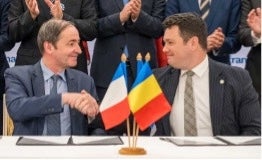
The International Energy Agency’s (IEA’s) 2024 Ministerial Meeting and 50th Anniversary event, co-chaired by France and Ireland, emphasised a commitment to safeguard energy security while speeding up clean energy transitions. The meeting, which was attended energy and climate ministers representing some 50 countries, sought to increase cooperation with major emerging economies, including talks with India on its request for full membership, and the establishment of a regional cooperation centre in Singapore.
While the press release on the meeting made no mention of nuclear, it did receive mention in one small paragraph of the 46-paragraph ministerial communique. Paragraph 15 of the communique noted: “Those countries that opt to use nuclear energy or support its use recognise its potential as a clean energy source that can reduce dependence on fossil fuels, to address the climate crisis and improve global energy security. These countries recognise nuclear energy as a source of baseload power, providing grid stability and flexibility, and optimising use of grid capacity, while other countries choose other options to achieve the same goals. We recognise the importance of ensuring the highest standards of nuclear safety, security and non-proliferation.
IEA Executive Director Fatih Birol told a press conference after the meeting: “For the first time, there was a full paragraph in the recognition of nuclear power to address energy security and climate change issues.In our communique it is clear that it is up to countries to pick nuclear or not – it is optional. There is no push for countries to make use of nuclear, but if countries opt to use nuclear power we have highlighted the benefits of that. It is up to countries to make their own strategies.”
Meeting co-chairman, France’s Minister for Industry & Energy, Roland Lescure said the opinion among French, European and global industrialists gleaned industrials over the past two years was that there was a great need for cheap low-carbon energy including a range of different ideas on how to achieve that. While Germany was focusing on renewables, France had “decided to go 50/50 – we are going to have nuclear and renewables”. He added: “The most important thing is to just do it. Let’s do it together … the time for ideological wars is over. Now is the time for action.”
Image: Energy leaders at the IEA meeting in Paris (courtesy of IEA)






